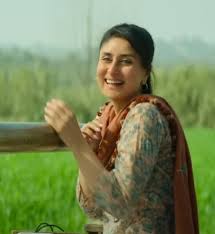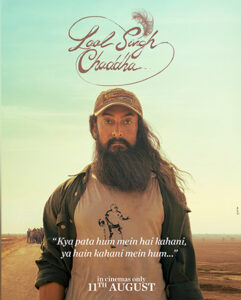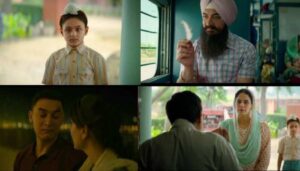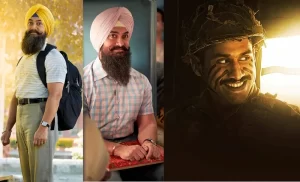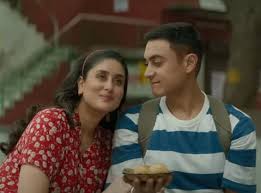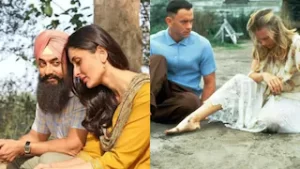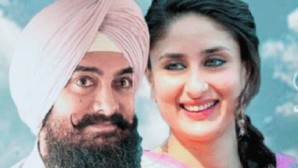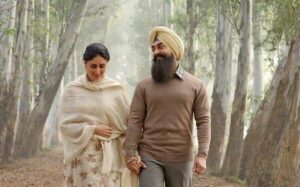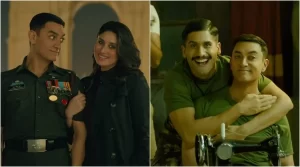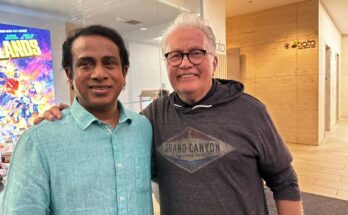Laal Singh Chaddha Tamil Movie Review
Cast-;
Aamir Khan , Kareena Kapoor , Naga Chaitanya , Mona Singh , Ahmad Ibn Umar , Manav Vij etc.
Crew-;
PRODUCTION COMPANIES – Aamir Khan Productions & Viacom18 Studios , TAMIL RELEASE BY – ED GIANT MOVIES – UDHAYANIDHI STALIN , DIRECTOR – Advait Chandan , WRITER – Atul Kulkarni , CINEMATOGRAP HY: Satyajit Pande (Setu) , EDITOR – Hemanti Sarkar , MUSIC – Pritam , BACKGROUND SCORE – Tanuj Tiku , TAMIL LYRISIST – Muthamil , PRO – P. Sri Venkatesh and Others .
Story-;
Laal (Aamir Khan) was named after his ancestors, and his mother (Mona Singh) had high expectations for him. Hi s legs were weak, but his mother never let his spirits get shaky. She always told him that he was no different from others. She told him to not believe anyone who tells him that he is not capable of doing stuff on his own. The only person who treated Laal like an equal was a girl named Rupa D’souza (Kareena Kapoor). Both the kids hung out together after school, and Rupa often didn’t want to go back to her home. Laal was always subjected to a lot of b ullying. Boys often picked on him and mocked him. One day, a group of fellow students started pelting stones at Laal when he was going back home. Rupa was with him, and she told him to run and save himself from those boy s. Laal started hobbling with his leg braces on. Slowly, the nuts and bolts of the braces started loosening. The me tal started clunking and finally the braces broke into pieces. Laal realized that he could run. From that day onwa rds, wherever Laal had to go, he used to run and make it there.
One day, Rupa didn’t come to school, and Laal went to visit her. He found Rupa sitting outside her house sobbing. Her mother was being subjected to domestic abuse. It happened quite often, but still, Rupa could never get used to that traumatizing sight and the voice of her mother asking her father to show some mercy. And how could sh e? She lived in a state of constant fear. She prayed to her God to make her rich, so that one day she could make th e violence stop and give her father all the money he needed. But that day, it went a bit too far. The mother methe r fateful end, and the father was taken in by the police. Rupa was sent to live with her grandmother, who used to work at Laal’s house. Laal was happy, because now Rupa was with him always. Laal’s mother sent him and Rupa to Hindu College in Delhi to pursue their graduation. In the university Laal took part in all the track events, wher eas Rupa started taking part in modeling competitions. She realized that if she became a model or an actress, she could earn a lot of money. She started fueling the dream of going to Mumbai and earning a lot of money. Laal’s m other had a unique way of sheltering her only child from the vices of the world. Whenever the country was bur ning with hate, she told him that malaria had spread and that he was only safe if he stayed inside his room.
Laal locked himself indoors whenever the country was fuming with hate and anger, be it during the 1984 anti-Sik h riots, the 1990 Rathyatra, or the Mandal Commission riots. Laal joined the Army, and Rupa went to Mumbai to make her dream of becoming an actress into reality. Laal met Balaraju Bodi (Naga Chaitanya) in the Army, who e ventually became his very good friend. Bodi’s family had been in the business of undergarments since time imme morial. Bodi pitched the idea of opening an undergarment factory once they left the Army. He asked Laal to be hi s business partner, to which the latter happily agreed. It was 1999, and India was in a state of war with Pakistan. Laal and Bala were in the same battalion. Their troops were given a mission to capture one of the peaks, occupi ed by infiltrators. The Indian Army misjudged the number of Pakistani soldiers, who had an advantage as they ha d an elevated vantage point. Rupa had told Laal to start running as soon as he felt that his life was in danger. He did exactly that. But when he reached the foot of the cliff, he realized that his friend Bala was left behind. He we nt back again, but every time he found some other fellow soldier who was injured and asking for help. He saw the Pakistani commander also lying on the ground. He didn’t know who was the enemy and who was a friend. He pi cked him up too, on his shoulders, and brought him down. He couldn’t save Bala, but he did save five other sol diers, for which he was awarded a medal by the Indian government.
Rupa never responded to any letters that Laal sent her. Rupa had been charged with obscenity, and a lot of peo ple, organizations, and NGOs were protesting against her. She later got associated with a lot of bad people. She wanted to become rich quickly. She wanted to take the shortest possible route, and obviously, it got her into a lot of trouble. She became the mistress of a gangster who took advantage of her, showed her dreams but never inte nded on fulfilling them(parallels are made to the controversial relationship of the infamous gangster Abu Salem and Monica Bedi ). Rupa could never become an actress. Laal kept meeting her at regular intervals. Once, he we nt to meet her and saw the gangster slapping her. He couldn’t resist the urge and ended up beating the gangster. Rupa told him that he couldn’t keep saving her throughout her life and that he would have to let her be. Rupa kn ew that Laal was the only person who loved her unconditionally, and the others were just there to take advan tage. She loved him too, but she wanted something very different from her life. She wanted to be rich at any cost.
Laal finally opened that production business for innerwear, as Bala had wanted. He stitched undergarments to gether with two other tailors, but they didn’t know how to market their product. That’s when Mohammed Baaji (Manav Vij) joined the team. Mohammed was the same Pakistani commander whose life Laal had saved. He had lost both his legs and didn’t know whether to thank Laal for saving his life or curse him for subjecting him to liv ing a life of such misery. He told Laal that he was destined to die on the battlefield. He wanted to kill Laal, but ho w could he? Here was a pure soul who did not understand what hatred meant. He didn’t understand that you sh ouldn’t save the life of an enemy and let him die. For him, every human was equal, and he didn’t know how to di fferentiate between them. Mohammed Baaji knew that he owed his life to this mad man who only saw good in others. He had an idea that instead of Bala, if the brand was named after a girl, then maybe their sales would in crease. Laal knew of only one girl. So his company was now called Rupa(a funny take on the knitwear giant). The sales started to grow exponentially, and soon the company was selling underwear to the whole of India. After a while, Mohammed Baaji decided to go back to his country and open a school. Laal’s mother also passed away, leaving him alone.
He used to think about Rupa every now and then. He dedicated his whole time to agriculture as somebody had to look after his lands after his mother passed away. Rupa did come back to him one day, but the happiness was short-lived. The police came searching for her as she had links to the gangster. She was sent to prison for six mo nths, and Laal was once again left alone. Rupa had gone without telling him. There was a lot of anger inside him. There was a lot of resentment, pain, and sadness that he was not able to deal with. So he started running. Maybe he was running from his past, from his loneliness and from his regrets. He thought that he might be able to esca pe it all. People on the other hand thought that he might be running for some great purpose. The media started covering his journey. He ran from the Himalayas to Kanyakumari. He ran from the desert in the west till he rea ched the Bay of Bengal in the east and covered almost every inch of the country on foot. After months of runnin g, he suddenly stopped. People had started following him. They had started running with him. They asked him why he stopped. They waited for some philosophical answer. They waited for the truth about the bearded man to be revealed. But Laal was a simple man who only understood simple things. He said that he was tired and that he wanted to go back home.
When Laal reached home, he was pleasantly surprised to know that Rupa had written him a lot of letters. She ha d served her sentence and was now living in Chandigarh. Laal couldn’t wait to go and meet her. Laal met Rupa an d found out that she had a kid named Aman. He thought that she would have married some other guy, but Rupa told him he was the father of the kid. Laal couldn’t express his joy. Rupa was suffering from an illness, and she kn ew that she didn’t have much time left. Laal decided to marry her, something he had been wanting to do since his childhood. Before Rupa left, Laal had already created memories for a lifetime. Laal took Aman to the same scho ol that he had gone to. When he went to drop him off on his first day, it felt like he had opened a magical box of m emories and nostalgia. He still remembered how his mother waited for him on the bench the whole day. He reme mbered how he met Rupa for the very first time. The circle of life had completed one revolution, and it was time for a fresh chapter to begin.
Watch The Trailor-;
Movie Review-;
Forrest Gump is one of those rare conservative films that I manage to like for its sentimental value. My political reservations against the touted classic are newfound, discovered only upon a recent rewatch. In the early days of cinephilia, I watched Forrest Gump with the baggage of its reputation and could admire its experience. After all, it is a feel-good English language film starring Tom Hanks. When I rewatched it with my parents, I could read its conservative tones. In my opinion, Forrest Gump essentially pitches the idea of an ideal “man” as conceptual ized and authorized by the right wing. A man who does without question, for the responsibility of work defines this man’s life. A man who believes more and questions less. A man who is indifferent to pleasure but passionate about love. A man who understands love better than those boastful of understanding it. But the virtual harmless ness of this man masquerades his subscription to the status quo. He is away from discourse.
The year Forrest Gump swept the Oscars, there were many competitors, including Shawshank Redemption, Lion King, and Pulp Fiction. And if you look at how well these movies have aged, I would say Forrest Gump’s likeability has only gone down over the years. It feels a bit cheesy when you rewatch it after all these years. So when some one decides to remake a film released almost three decades ago, we would certainly expect a fix in writing. But the Aamir Khan remake, Laal Singh Chaddha, is only successful in transporting the story to an Indian backdrop. Now, it isn’t that men like Forrest don’t exist. They certainly do. And they also achieve. The course of their life ta kes all the turns as anyone else’s. They have a tryst with happiness and sorrow. Sorrow is permanent, happiness is ephemeral but sustainable. Telling the story of these men isn’t a problem. The problem lies when the man, a p rotagonist, becomes a personified argument from the side of the filmmaker.
Therefore, quite disappointingly, Gump’s apathy-cum-indifference to counterculture despite his love for Jenny amplifies the perceived (by rightwingers) futility of counterculture itself. This is where Laal Singh Chaddha bec omes better than Forrest Gump, in its dilution of political conservatism. The dilution is less intended and more d efault. The primary reason is the absence of a counterculture movement in India. India was never liberalized in any shape, despite all political turmoils. On the contrary, it has grown to become more intolerant and conserv ative. Laal Singh Chaddha doesn’t become antithetical to intolerance, but its positioning in a dynamic political landscape causes it to become unassumingly anti-establishment. The story is about Laal Singh Chaddha, who has a lower IQ than other people of his age. But his mother always told him not to feel inferior.
The story of Laal Singh Chaddha shows how this man with a low IQ managed to survive in a cruel world by being empathetic. Hence, the film’s fundamental character is quite different from its inspiration. First, Kargil War was in response to an invasion, unlike the Vietnam War, which itself was an invasion. Even if Kargil War is considered from the perspective of the then-enemy state of Pakistan, the escalation of conflict is diplomatic. Vietnam War was a violent manifestation in the aftermath of the second red scare in which a self-proclaimed superpower atte mpted to bully a nation into a political ideology. Laal is non-violent, reminiscent of Desmond Doss from Hacksaw Ridge. So was Forrest, but perhaps Laal is more vocal about it. When the war occurs in Forrest Gump, it becomes a matter of survival for the elite American forces against the guerilla force of the enemy.
When the war occurs in Laal Singh Chaddha, it becomes a matter of survival for all involved. The loss of life is gi ven sufficient focus to highlight the futility of war itself. While being (or pretending to be) politically neutral, Laal Singh Chaddha talks about major events in the history of modern India and its after-effects without omitting the causes. It exposes its irreligious stance in passages. Laal Singh Chaddha is what Forrest Gump poses to be. As me ntioned earlier, Forrest is the right winger’s idea of himself. The applied simplicity and limited comprehension of the protagonist are to tell that we reject inherent sociocultural complexity for its pretense. Rather, we act to ma ke the world function while the rest of you (us) only talk. Laal Singh Chaddha is actually about simplistic virtues and spontaneous living. Innocence does not envelope deceit. Is it very different? No. In the end, Laal also stands for the most rational choice for those involved, as did Forrest Gump. Laal is also made to be the optimum can di date for familial and professional responsibilities.
It also says that you can waste your time as much as you wish, for you only have to take refuge in me. In this way, Laal Singh Chaddha is as inherently patronizing as Forrest Gump. Frankly, you won’t hate watching Laal Singh Ch addha because the movie keeps us guessing as the setting is different. Atul Kulkarni, who has written the Indian adaptation of the film, is trying to incorporate the events that happened in India’s history post-emergency. Wh en the movie entered that phase where operation Blue Star was shown, I kind of felt a sense of excitement bec ause you could feel them reworking the script. But that fire runs out too quickly. Almost every event that happ ens after we see the adult Laal feels hasty. The running that occurs in Forrest Gump had a smooth entry in the screenplay, and those sarcastic undertones worked. If someone who hasn’t Everything isn’t a betterment in this adaptation. The adaptation of Jenny in Rupa is evidence of the lack of understanding men have for women. Some of Jenny’s actions were trauma responses, but the rest were the outcome of her exercising autonomy.
Jenny was choosing for herself in a suffocating, patriarchal world where women are told what to do rather than allowed to choose. It doesn’t matter how much was out of self-hatred and how much was out of self-love. Forrest was a caring but imposed savior. So is Laal to Rupa. However, all of Rupa’s actions are made to be trauma resp on ses. She is reduced to a gullible individual who’s running. While Jenny runs from her past, Rupa is shown to be ru nning towards a fantasy future she has envisioned. Nevertheless, it is intelligent that in the absence of an Ind ian counterculture backdrop, Atul Kulkarni builds Rupa into a real-world character(s) of someone stuck in the nex us of crime and cinema. Although, it hurts how vocal Rupa is in her delusion. The star of the film is Atul Kulkarni, who has adapted the screenplay. He is clever with his choices of settings, environment, and characters. The ti me line is smooth. Laal Singh Chaddha is often cinematic. Stories are built into stories. The one element where it be comes criminal is the performance by the protagonist.
Aamir is earnest in a couple of moments, but otherwise, he parodies disability and churns a mockery to mimic a bit and diverge a bit from Hanks’ performance. Shahrukh also faced scrutiny for his performance in My Name is Khan, but it is still a better performance in a better film. watched Forrest Gump sees this film, they would feel that phase as an absolutely bizarre detour. Laal Singh Chaddha has more surprises than disappointments. The opening (and closing) song is the philosophical concentrate of the entire film. The music sets Laal Singh Chaddha apart almost instantly. I personally recommend the film despite apprehensions. You can’t believe it without watching.
This IS MY Personal Review So Please Go And Watch The Movie In Theaters Only
Written By- T.H.PRASAD -B4U-Ratting- 4/5


